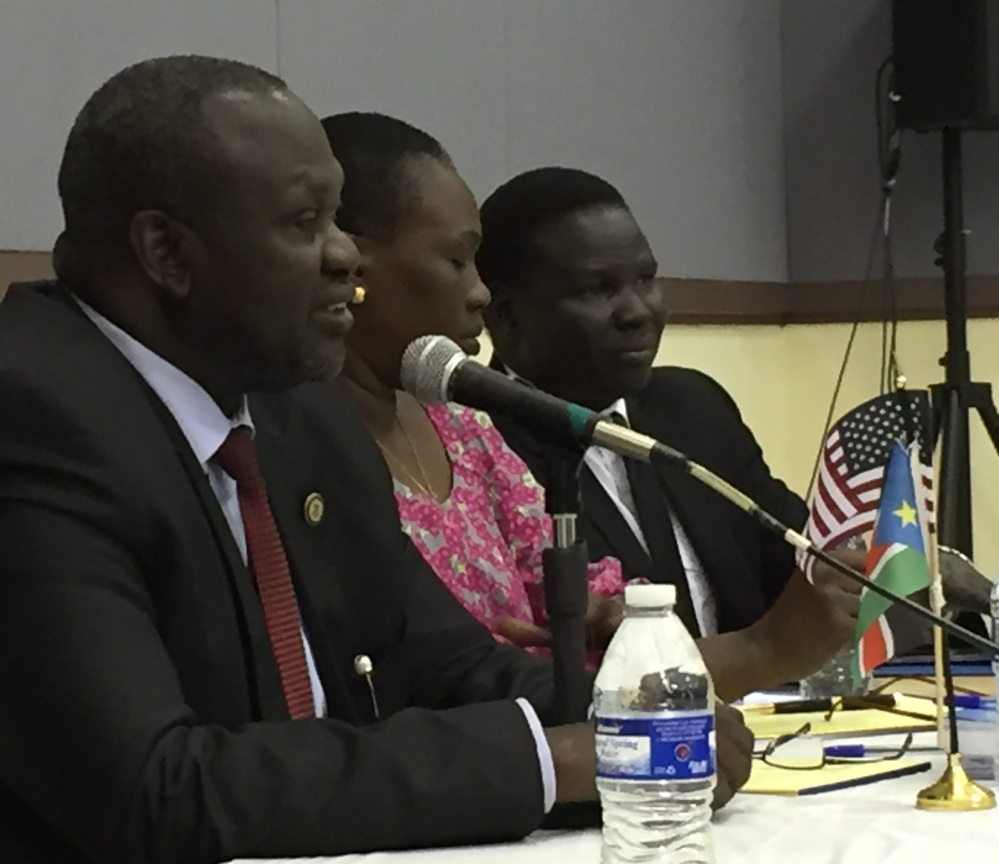South Sudan rebel leader Riek Machar visited Portland on Friday to reassure expatriates living in New England that the country’s bloody civil war is finally over.
Macher, who traveled to the U.S. this week with a group of South Sudanese dignitaries to attend a United Nations summit, signed a peace agreement in August with the war-torn east African country’s president, Salva Kiir. The agreement requires Machar, the former vice president who was ousted by Kiir in 2013, to be reinstated as part of a transitional government while Kiir is to remain president.
About 1,500 refugees from South Sudan live in Portland, along with thousands more across the U.S. They are anxiously awaiting evidence that the latest peace deal will not fail, as previous attempts have.
“I’m here and I’m safe,” said New Hampshire resident Savina Kenyi, who attended Machar’s speech. “But what about my sisters? What about my mother? What about my kids over there? We need this to stop.”
South Sudan is the world’s youngest nation, having liberated itself from Sudan in July 2011. However, violence erupted five months later between forces of the government and a group of opposition leaders that included Machar.
“All of a sudden, the hopes of millions were dashed,” former South Sudan Ambassador to the U.S. Ezekiel Lol Gatkuoth said at Friday’s meeting. “Why? What happened? What went wrong?”
Each side of the war has blamed the other, with Kiir accusing the opposition of attempting a coup, and Machar accusing Kiir of trying to eliminate his most vocal critics.
There also has been an element of ethnic conflict to the civil war, as Kiir is a member of the Dinka ethnic group while Machar belongs to the Nuer group.
On Friday, Machar spoke before an audience of about 300, the vast majority of them South Sudanese refugees. He said the peace agreement signed by both him and Kiir contains all the necessary elements to achieve lasting peace, including states’ rights, a hybrid court that includes judges from both sides of the conflict, and institutional reforms to curtail corruption.
“This document is good – it stops the war,” he said.
Machar praised a U.N. report publicized this week that offers several recommendations for how the transitional government should move forward. He expressed hope that those recommendations would be implemented.
However, Machar also criticized Kiir for failing to attend this week’s summit in person. The president reportedly refused to attend because he felt the U.N. had disrespected him. He sent the current vice president, James Wanni Igga, in his place.
“The absence of the president of the state in the meeting was not a good sign,” Machar said. “We were hoping that we would meet with them.”
South Sudanese expatriates have good reason to be skeptical of the new peace agreement. It is the fourth such deal signed by Kiir and Machar since January 2014. Each of the three previous efforts broke down quickly, and violence resumed.
Even now, obstacles remain. A second rebel faction has broken away from Machar’s group and is vowing not to recognize the August cease-fire. Reports of violence in some areas of the country persist.
Machar said he thought it was important to visit Portland and other U.S. cities with significant numbers of South Sudanese expatriates to explain the current situation and what they should expect in the future.
Portland resident John Sebit, New England secretary-general of the Sudanese People’s Liberation Movement in Opposition, Machar’s political faction, said the transitional government is scheduled to be formed within the next 60 days. After leaving Portland, Machar is scheduled to travel to the Midwest and Southwest to deliver the same message of “why and how this peace deal is going to work,” Sebit said.
Kenyi said she felt a sense of hope that the peace agreement would hold and the people’s suffering would end.
“It’s not easy to build a country from ground zero,” she said. “But if we have unity and we are working together, we can build it.”
Send questions/comments to the editors.




Success. Please wait for the page to reload. If the page does not reload within 5 seconds, please refresh the page.
Enter your email and password to access comments.
Hi, to comment on stories you must . This profile is in addition to your subscription and website login.
Already have a commenting profile? .
Invalid username/password.
Please check your email to confirm and complete your registration.
Only subscribers are eligible to post comments. Please subscribe or login first for digital access. Here’s why.
Use the form below to reset your password. When you've submitted your account email, we will send an email with a reset code.